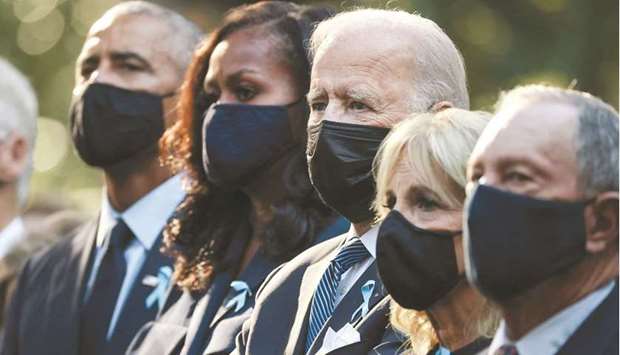Twenty years after hijackers slammed airplanes into New York City’s World Trade Center and the Pentagon outside Washington, Americans came together yesterday to remember the nearly 3,000 killed on Sept 11, 2001, and reflect on how the attacks reshaped society and tipped the country into an intractable war.
As a first responder struck a silver bell, the ceremony at the Sept 11 Memorial in lower Manhattan began with a moment of silence at 8:46am EDT (1246 GMT), the exact time the first of two planes flew into the World Trade Center’s twin towers.
President Joe Biden was on hand, his head bowed.
Mike Low, the first speaker of the day, described the “unbearable sorrow” caused by the death of his daughter, Sara, a flight attendant on the airliner that hit the North Tower.
“My memory goes back to that terrible day when it felt like an evil specter had descended on our world, but it was also a time when many people acted above and beyond the ordinary,” he said. “A legacy from Sara, that burns like an eternal flame.”
Relatives then began to read aloud the names of 2,977 victims to the thousands who had gathered on the cool, clear morning, among them former president Barack Obama and Hillary Clinton, New York’s junior senator at the time of the attacks.
Bruce Springsteen sang “I’ll See You in My Dreams”. Uptown at the Lincoln Center dancers performed in silver and white robes, signifying the ashes and purity of the fallen.
After leaving ground zero, Biden headed to Shanksville, Pennsylvania, where Flight 93 was downed after passengers fought to regain control of the hijacked plane.
His final visit was to the Pentagon, headquarters of the US Defence Department in Arlington, Virginia, to pay tribute to the 184 people who died there in the crash of Flight 77.
The remembrances have become an annual tradition but yesterday had special significance, coming 20 years after the morning that many view as a turning point in US history, a day that gave Americans a sense of vulnerability that has deeply influenced the country’s political life since then.
In a painful reminder of those changes, only weeks ago US and allied forces completed a chaotic withdrawal from the war the United States started in Afghanistan in retaliation for the attacks — which became the longest war in US history.
And the Covid-19 pandemic, which so far has claimed more than 655,000 lives in the United States, continues.
In a ceremony at the Pentagon, Chairman of the Joint Chiefs of Staff General Mark Milley talked about the 2,461 US service members killed in Afghanistan, including 13 during last month’s disorderly exit, and the closing of “this terrible chapter in our nation’s history.”
Speaking in Shanksville, former president George W Bush, who took office eight months before Sept 11 altered the trajectory of his presidency, said the unity shown after the attacks seemed a far cry from the rifts now dividing Americans.
“Malign force seems at work in our common life,” he said. “So much of our politics has become a naked appeal to anger, fear and resentment.”
At sunset, 88 powerful lightbulbs projected twin beams 4 miles (6.4km) into the sky to mirror the fallen towers.
This year, buildings across Manhattan, including the Empire State Building and the Metropolitan Opera, joined the commemoration by illuminating their facades in blue.
The 20-year milestone arrives as political leaders and educators fret over the thinning collective memory of that day.
Some 75mn Americans — nearly a quarter of the estimated US population — have been born since Sept 11, 2001.
At her home on Long Island, Danielle Salerno, 50, and her children dug a hole in the backyard and planted a weeping cherry blossom tree in a tribute to her late husband, a broker at Cantor Fitzgerald who was on the North Tower’s 104th floor.
For some, the tumultuous events in Afghanistan have compounded the psychological toll of the day, raising questions about whether the US military’s mission there was in vain.
Alain Michnick, a finance professional who lived a couple miles north of the World Trade Center 20 years ago, said he has mixed feelings about some of the actions taken by the US military since then and how society has changed.
“I think it changed the world in a lot of ways in a bad way because it turned people to be kind of paranoid and violent to some degree,” said Michnick, who came to commemorate the moment outside the ceremony at ground zero.

US former president Barack Obama, former first lady Michelle Obama, President Joe Biden, First Lady Jill Biden and former New York City mayor Michael Bloomberg attend the annual September 11 commemoration ceremony at the National 9/11 Memorial and Museum in New York City yesterday.
